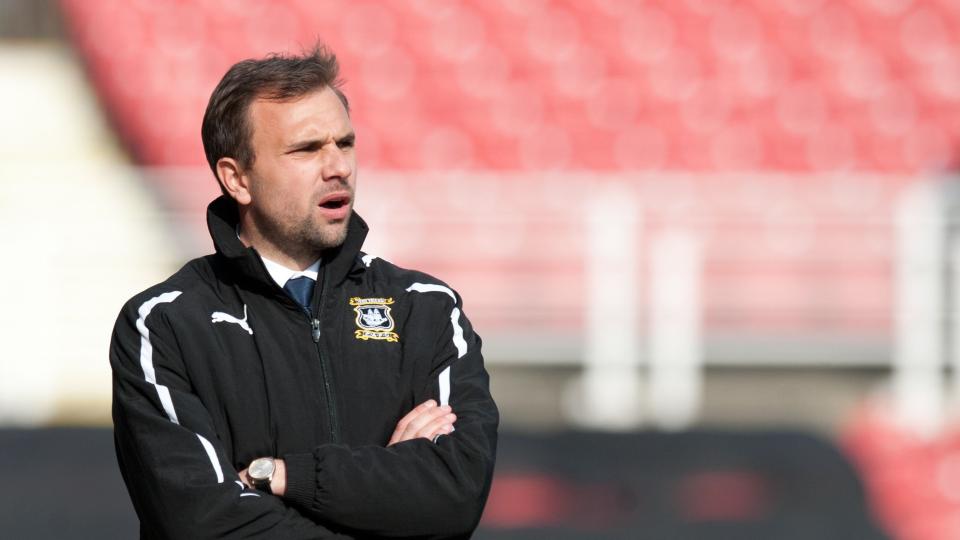Argyle Football Media Officer Rob McNichol offers some observations on Carl Fletcher’s appearance on episode 101 of the Argyle Podcast…
It was wonderful to hear that Carl Fletcher was going to appear on the Argyle Podcast, for several reasons.
As much as anything, I knew his interview with Charlie Price was going to be an interesting one, but also it was good to know that someone who had a bad experience in some ways during his time as a Pilgrim is able to still regard our club fondly.
The day that Carl left Argyle remains one of the strangest days I have ever experienced in football. It was New Year’s Day 2013, Argyle had just lost at Bristol Rovers and I was working with the media department, not on a full-time basis, but assisting on match days. I got wind that Fletcher was to be sacked after the final whistle, and was more shocked than anyone when Carl walked into the Memorial Stadium’s press room and simply started taking questions as normal.
After a few remarks about the 2-1 defeat that had occurred that day, BBC Radio Devon’s Gordon Sparks asked Carl what he thought could be done about the run of bad results. Matter-of-factly, Fletcher said that he felt that owner James Brent had already done it, remarking with three words I can still scarcely believe he uttered in such throwaway fashion: “That’s me sacked.”
Gordon paused to take it in. I recall seeing the Plymouth Herald’s Chris Errington raise his head, computing what he had just heard. It was a unique situation, I think, for us all. Here was a man who had battled through Argyle’s worst-ever period, as captain and then manager, giving his all, who was now rather flippantly, it seemed, announcing his departure.
There was no flippancy about the meaning behind the remark, though. I did not know Carl well, but I was around him enough in those days to clearly see two things: how much he cared about the football club he had taken so much responsibility for, and the pride he took in everything he did. Those two things were not mutually exclusive.
Carl facing the press that day, and weeping, are remembered by many fans. It was a hugely brave thing to do, and when listening to Charlie’s podcast with Carl, which is now available, it was the thing I was most interested in hearing about.
Asked what he was thinking in facing the press in such a way, Carl said: “I just felt like I had to.
“[It was] stubbornness, maybe. Football is based on emotion. I cared about the people and wanted to do well for them and a town that had embraced me.
“I wasn’t upset about getting the sack; it was everything from the past three years beforehand coming out. It was more the people; I felt like I’d let people down. I saw Neil the kitman after I’d been told, on my way to the press, and we hugged it out. He bawled his eyes out, which sent me over the edge. All the emotion of that period just came out. You have such a bond with people, and to think I had let them down, it got to me.
“I didn’t want to fail. I knew what a good place it was, what good people were there. When you have relegations, you just want to bring back the happiness.”
A little over 10 years has now passed, and Fletcher is now Loans Manager at Bournemouth, the club at which he began his playing career. With a decade of clearance, Fletcher says that in hindsight, he perhaps should have not have accepted the Argyle manager’s job on a permanent basis, having worked alongside Romain Larrieu and Kevin Nancekivell to ensure the club’s survival in the EFL the previous season.
“They year after we stayed up, I don’t think I should have taken the job,” said Carl. “I should have gone back playing, or gone to a player/coach role, and we could have got someone else more experienced in. Maybe I was on a high from year before, but I thought I could do well. We tried to do the best we can, but it didn’t turn out that way.
“I’d like to mention James Brent. He was amazing, saving the club initially, and as a human being he was an amazing guy. Jason Turner, who is no longer with us, was secretary at the time, he was a massive part of it with the work he did at the time to help me, Ro and Nance too.
“For that period, everyone gave everything they had. The impact of going out of the football league wasn’t just impacting the players, but the fans, and the infrastructure of the town. A lot of the players in the team felt that and gave everything to get us over the line.”
Inevitably, discussion of Fletcher’s time at Argyle is always going to focus on the negatives, as there were so, so many going on. After arriving, initially on loan and then signing on a permanent basis, Carl became captain and played 107 times, becoming the club captain. During his time at Home Park, Argyle suffered two relegations, narrowly avoided a third, and went through an almost-terminal financial crisis.
It is critical to remember what Fletch gave us, though. That is: everything he could.
He played, essentially, for two full seasons, and was Player of the Year in both. He was the epitome of a hard-working, dedicated captain who shouldered responsibility on and off the field, as well as possessing no shortage of quality, too. We are lucky to have a very similar figure at this moment in time in Joe Edwards.
Some of you reading this will remember the dark days of a dozen or so years ago, despite perhaps wanting to forget, and will know all too well what went on then. Some, though, may be younger, or newer followers, who might hear the name of Carl Fletcher, remember the tears in a media room in North Bristol, and think of him simply as a failed manager.
Please do not do so.
Carl Fletcher was the epitome of what you want a footballer, and a person, to be. He worked hard – above and beyond – led by example, cared about people and cared about the job he was tasked with doing. There are plenty of people who ought to shoulder some blame about what Plymouth Argyle went through in that era. Fletch is not one of them.
Football club heroes are usually – and rightly – those who win promotions and titles. But some do their bit to ensuring that others will have those times of glory.
We shall end this piece with some more words from Carl about his time at Argyle that I found fascinating, and I am sure you will too. The podcast is available now on Apple Podcasts, Spotify and the usual podcast outlets. You can also listen via Argyle TV. I promise it is a fascinating, hour-long listen, and the 100 podcasts that precede it are excellent value as well.
Fletcher on arriving at Argyle:
“When I first came down, the club was – we thought at the time – on pretty solid foundations. Great crowd, decent squad – then everything crumbled around us.
“We probably didn’t realise the magnitude of everything that was going on until a few years later. It was a difficult period for the players, the staff and the fans. Where the club is now, it just shows the kind of people that love the club, support the club and have it in their hearts.
“There are a lot of clubs that get into financial issues, but there are not many that could get through what Argyle did at that time.
“It started off ok, and then there were whispers about the money side, and it seemed to get really fractured really quickly. I don’t think there were fractures in the dressing room - everyone respected one another - but everything seemed to be falling apart on the outside. You’d hear this guy saying we were massively in debt and this guy saying ‘no, we’ll be alright’. It snowballed from there.
“It was a difficult time. We were expecting to stay in the Championship, even have a little push for the top half or maybe the play-offs, but we never got going at all. There was an acceptance of what was happening off the pitch, and that transcended into the playing side, probably subconsciously. How we were going into games was disjointed; it almost became secondary.
“As the weeks went on, and the realisation of the situation, then you become more concerned about where it would take us and how it would impact everyone involved. I was always of the belief that someone would just come along and buy it. I didn’t expect it to go as bad as it did. The longer it went on, the harder it became.”
Fletcher on replacing Peter Reid:
“I feel for Peter, because he was sold a dream and not long afterwards everything came out in terms of where the club was at. He had the rug pulled out from under him.
“I got sent off at Southend; I grabbed the geezer by the throat, and that was a culmination of frustrations built up over a number of months. I missed the next three games, and Peter left.
“I don’t think there was a lot of money to give to a new manager, and managers would have been looking at it, saying: ‘the club is in debt, with no owner, in administration, with a transfer embargo and they are losing games.’ It wasn’t an attractive proposition.
“They asked me if I wanted to do it. I was captain, older with a bit more experience, and like a classic older player, I thought ‘yeah, that would be really easy’ which is the most naïve thought I have ever had. I knew what everyone had gone through, because I had gone through it with them.
“Although I tried to be a manager as much as I could, I tried to be a player to get that togetherness between the whole squad, that would get through it with belief and desire.
“It was tough, I won’t lie. I had no experience managing or coaching. We got through it, with a couple of games to spare. That was one of my biggest achievements, to keep Plymouth up that season.”



